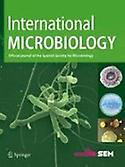The microbiology of the future: the application of omics in microbiology
Jörg Overmann Leibniz Institute DSMZ-German Collection of Microorganisms and Cell Cultures GmbH
Dr. Overmann, Coordinator of Bioresources, Biodata and Digital Health at the Leibniz Institute-German Collection of Microorganisms and Cell Cultures, transports us to the microbiology of the future that is already knocking on our doors, explaining to us what omic techniques can teach us about the adaptations and functions of bacteria. Throughout his talk, the researcher has presented us with such interesting topics as the discovery of “dark matter” or the unfathomable part of microbiology, which constitutes the vast uncultivable and unknown majority of invisible life on Earth. He has talked to us about how to establish microbial ecological niche models through independent cultivation techniques, using the example of the phylum acid bacteria, where a significant correlation between the predictions and the observable physiological characteristics is achieved, which indicates that this type of models can provide us with perspectives where laboratory phenotypic studies do not reach. It has also addressed the challenge of characterizing low-abundance microbiomes, as is the case of the human lung microbiome where, despite bacterial cells being more abundant than our own cells, the unfavorable proportion of the size of both types of genomes makes it very difficult to characterize isolation of bacterial DNA, so a prior step is needed that not only enriches the prokaryotic fraction but also keeps the composition of the microbial community unchanged. Another typical problem of this type of low-abundant microbiomes is the need to detect non-authentic DNA present in the samples, either due to contamination or as an artifact of the different techniques used. Dr. Overmann has illustrated us with the example of the oral microbiome. Despite all these advances, Overmann concluded his talk by indicating that bacterial isolates are still necessary for high-resolution comparative genomics that allows us to relate genotypes to phenotypes. To illustrate this he gives us the example of a study on speciation mechanisms in Phaeobacter, a microorganism with high metabolic flexibility, capable of colonizing algae, bryozoans, mollusks, crustaceans and fish, alternating states of symbiosis and pathogenesis. Using comparative genomics, Overmann and his collaborators have been able to establish how physiological differences drive the colonization of potential niches, with a good correlation between the prediction and physiological properties, highlighting the importance of lateral gene transfer in their Evolutionary process. In this same topic of comparative genomics, he ended up talking about Clostridioides difficile, a nosocomial pathogen that causes pseudomembranous colitis or antibiotic-associated diarrhea, with high morbidity and mortality. This species presents different clades in its phylogeny, which the professor studies using domain B of the gene tcdA of the pathogenicity locus, PaLoc. Although they are capable of detecting up to 17 different groups of phages, these sequences show high co-diversification and evidence a recent infection. On the contrary, strains seem to differ mainly based on the content of transposons, these elements being therefore the most effective mechanism proposed for gene acquisition. Despite all these advances that increasingly allow us to use metagenomics and modeling together with statistical analyzes in studies with environmental parameters, the lecturer concludes that, in closely related ecotypes, a good understanding of speciation is only possible if we base ourselves on isolates. cultivable since, today, culture-dependent studies still provide us with more sensitivity than omics. In any case, high-quality information from genomes can give us deep insight into genomic evolution and the role of the mobilome in this process.
Summary prepared by Magdalena Martínez Cañamero of the University of Jaén.





No comment yet, add your voice below!